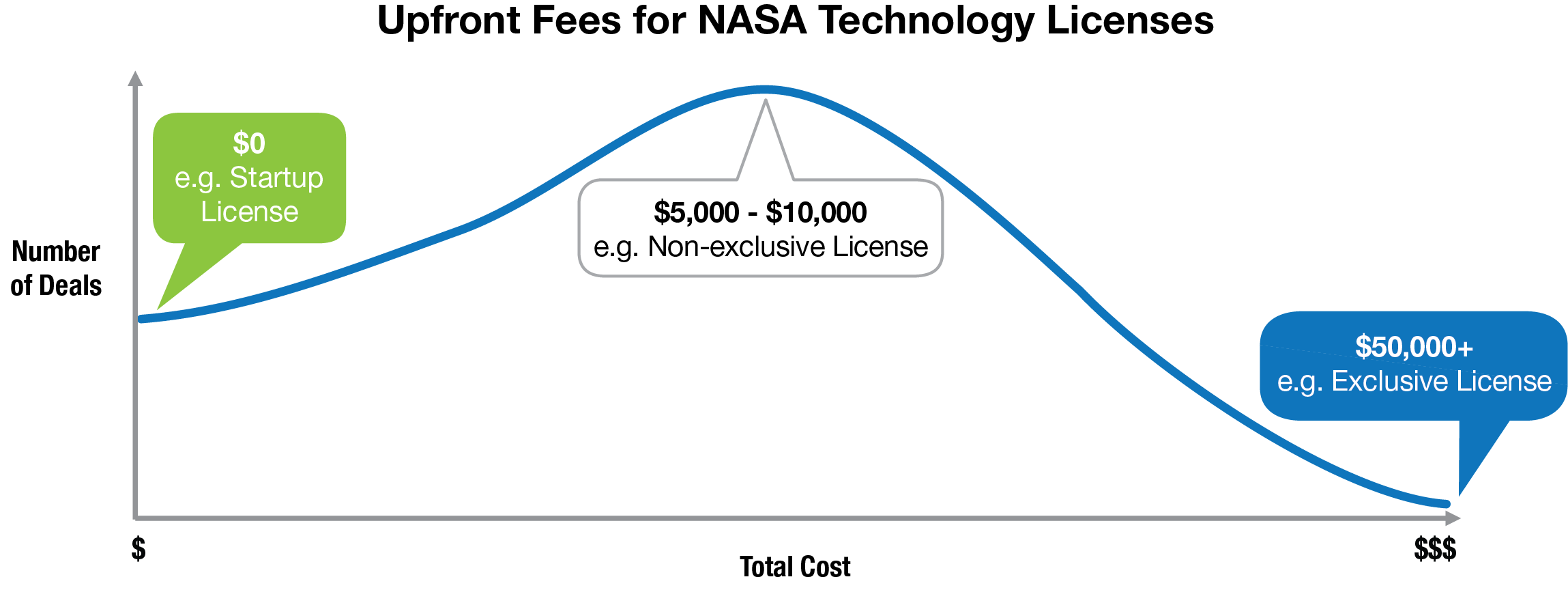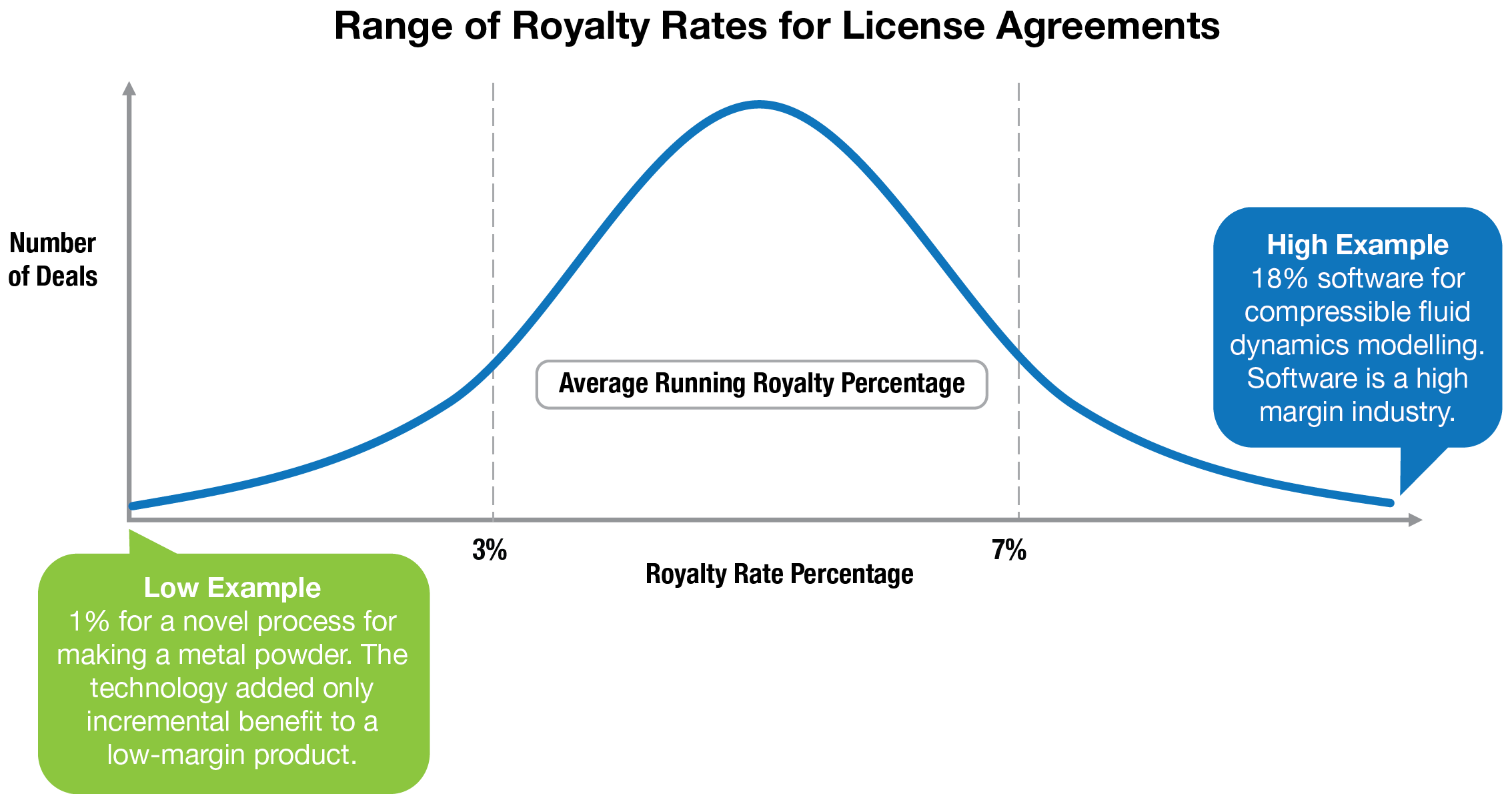- List of all requested technologies
- Company contact information
- Basic plan for the use of the NASA technology
- Proposed fees and royalties
- Technology development plan
- Marketing and sales plan
- Projected financial statements, including investment requirements
- Current balance sheet and income statement
- Management and staffing plan
- Risk assessment and mitigation
NASA offers an "Evaluation License" option that will allow you short-term permission to explore the potential of a technology and learn if it will fit into your business development goals. An evaluation license is also required if you intend to enter into an agreement to have NASA conduct testing on the technology on your behalf.
A standard evaluation license is granted for a period of 12 months for a cost of $2500. However, the terms of the license may be adjusted to meet the specific needs of the company.
The important details:
- All evaluation licenses are non-exclusive agreements.
- Most evaluation licenses last 1 year. There may be exceptions that would allow the evaluation license to extend past 2 years.
- No pro forma statement is required for an evaluation license application.
- If another company submits a license application and it is approved, all evaluation licensees will be provided a 30-day notice.
- Evaluation licensees are not permitted to commercialize or sell the technology. A traditional commercialization license agreement must be in place before any sales can take place.
- If there is a third-party company that will be helping the evaluation licensee in determining if the NASA technology is marketable, the third-party company must also submit a NASA research license in order to proceed with evaluation.
- A Space Act Agreement must be in place in order for the evaluation licensee to utilize NASA's expertise and/or facilities.
How does an evaluation license differ from a nondisclosure agreement?
With a nondisclosure agreement, or NDA, NASA will be able to answer basic questions about the mission use of the technology, but we are not able to discuss how the technology could be adapted to your specific use case. Additionally, you would not be permitted to conduct testing, experiment, create prototypes, or discuss the technology with investors without the evaluation license.
The best way to manage your cash flow as a startup? Hold on to your money.By offering a license with no up-front costs for commercial use of our patented technologies, we're letting companies hold onto their cash while securing the intellectual property needed to carve out competitive market space.
- These technologies have been vetted for technical and commercial viability by NASA and external sources.
- Patents are maintained and protected by the US Government.
- NASA technical personnel and facilities can be available to lend additional support.
- This offer is open only to companies formed with the express intent of commercializing the licensed NASA technology.
- NASA waives the initial licensing fees, and there are no minimum fees for the first three years. Aftter that, there is an annual minimum licensing fee of $3,000.
- Once the company starts selling a product, NASA will collect a standard net royalty fee of 4.2%. This money goes first to the inventor and then to maintaining the agency's technology transfer activities and technology advancement.
- This announcement applies to only non-exclusive licenses, which means other companies may apply for similar rights to use the technology for commercial purposes. However, NASA will consider further exclusivity if the startup wishes to negotiate.
- Companies entering into these licenses are bound by all requirements in federal licensing statutes and NASA policies, including development of a commercialization plan and reporting on efforts to achieve practical application.
- While NASA does license to foreign entities, this start-up agreement is only available to companies in the United States.
Step 3: Set Terms for the Agreement
After submitting your license application, the terms of the agreement are worked out by you and the NASA license manager.
Every deal is different. Companies can apply for rights to a single technology or a group of technologies. You may want exclusive rights, worldwide, or in a field of use or geographic region that is important to you. Costs will vary in consideration of the types of license that is granted. The curve below shows how license fees change with the value of the rights granted.

When you talk with the NASA licensing team, you will learn that there are 3 components to licensing fees:
- an upfront fee—a lump sum payable on the signing of the patent license agreement. For non-exclusive licenses, these upfront fees usually range from $5,000 to $10,000, though we offer special licensing terms with no up-front fees to startup companies. Exclusive license fees are higher, and since each one is unique, it is difficult to provide an accurate range. It is through the upfront fees that NASA seeks to recover some of its investment in the patent filing and maintenance costs.
- yearly minimum royalties—Based on the business plan, these fees are designed to ensure that licensees are actively engaged in working toward commercial applications.
- running royalty percentage—Based on revenue, these fees are negotiated, but generally range anywhere from three to seven percent. They can also be negotiated down by a higher upfront fee. Within the range, fees may vary by the readiness/maturity of the technology, the industry application of the technology, and the exclusivity desired by your organization.

Considerations that impact licensing fees include:
- In what industry will the technology be sold or used?
Royalty rates factor in the margins of the industries in which the licensee operates. Royalty rates in larger margin industries, such as aeronautics are higher than lower-margin industries like coatings or environmental.
- How mature is the technology?
NASA licenses technologies at all stages of development. Less mature technology requires more investment from the licensee to develop the technology so lower fees and/or royalty rates may be justified; however, a mature technology is more market-ready and commands fees and/or royalty rates in the higher end of the range.
- What degree of exclusivity is needed?
Exclusivity pushes fees to the higher end of the range, as it can provide significant value for a business plan. And, it limits competition and opportunities for multiple licenses.
Step 4: Sign the License
When terms for the license are set, NASA and the company execute the license under the terms of the agreement.
After the license is granted, NASA monitors the licensee’s sales of products and services that use the licensed technologies. Our team may write success stories and, upon approval by the licensee, these may be published on NASA’s Web site, in NASA’s Spinoff magazine, or other publications.
NASA's priority is to license its U.S. taxpayer-funded technologies to benefit the American tax payers, through increasing US economic competitiveness and/or promoting public availability of new products and services.
While our licenses are most often to domestic companies, we are able to license to foreign-owned companies, though with some additional considerations:
- NASA's patents are filed with the USPTO and within the United States jurisdiction. We only file PCT applications when a licensee is willing to pay for the additional patenting costs in the countries they select (within 1 year of filing the original US patent.)
- Licenses to foreign-owned companies requires additional steps and reviews, which can introduce an additional 6 to 8 weeks to the licensing process. This includes approval by the US Trade Representative, a review process that NASA will coordinate.
- Licenses are typically granted to a company that agrees any resulting products will be primarily manufactured in the United States. (NASA may waive or modify this requirement if reasonable but unsuccessful efforts have been made to grant licenses to companies that would be likely to manufacture substantially in the United States or if domestic manufacture is not commercially feasible.)